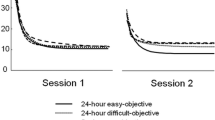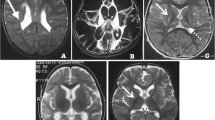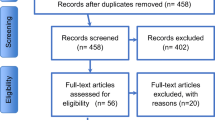Abstract
Objectives
This study observes the trajectory of the motor development of a child with autism spectrum disorder (ASD) from the perspective of multiple time scales and elucidates how the movement of the child changed through interaction with tasks and the environment.
Methods
To analyze the trajectory of motor development in more detail, the present study focused on the case of one child with ASD in a motor development clinic, specifically examining the variability of the ball-throwing motion throughout 11 months and analyzing the interaction between the trajectory of the motion variability and the task.
Results
Throughout the observation period, two different tasks were performed, and a total of 135 ball-throwing motions were observed. These motions repeatedly varied between large and small, indicating that the constraints of the tasks strongly impacted him. In the phase of rapid movement variation, his psychological situation when faced with the task influenced how he directed his attention during the performance, which affected the final expression of ball-throwing motions. This indicates that one’s psychological situation of adapting to changes in the task influences the fluctuation of large and small movements.
Conclusions
This trajectory of motor development was considered to be a process of “adaptive variation,” in which the subject searches for a strategy adapted to them in response to the task encountered, which is an important factor in motor development.


Similar content being viewed by others
Data Availability Statement
The data that support the findings of this study are available from the corresponding author, YM, upon reasonable request.
References
Adolph, K. E., & Robinson, S. R. (2011). Sampling development. Journal of Cognition and Development, 12(4), 411–423. https://doi.org/10.1080/15248372.2011.608190
Adolph, K. E., Cole, W. G., & Vereijken, B. (2015). Intraindividual variability in the development of motor skills in childhood. In M. Diehl, K. Hooker, & M. J. Sliwinski (Eds.), Handbook of intraindividual variability across the life span (pp. 59–83). Routledge/Taylor & Francis Group.
Bernstein, N. (1967). The coordination and regulation of movements. Pergamon.
Bernstein, N. A. (1996). On dexterity and its development. In M. L. Latash & M. T. Turvey (Eds.), Dexterity and its development (pp. 9–244). Lawrence Erlbaum Associates.
Bremer, E., Crozier, M., & Lloyd, M. (2016). A systematic review of the behavioural outcomes following exercise interventions for children and youth with autism spectrum disorder. Autism, 20(8), 899–915. https://doi.org/10.1177/1362361315616002
Colombo-Dougovito, A. M., Kelly, L. E., & Block, M. E. (2019). The effect of task modifications on the fundamental motor skills of boys on the autism spectrum: A pilot study. Journal of Developmental and Physical Disabilities, 31, 653–668. https://doi.org/10.1007/s10882-019-09666-4
Cook, J. L., Blakemore, S. J., & Press, C. (2013). Atypical basic movement kinematics in autism spectrum conditions. Brain, 136(9), 2816–2824. https://doi.org/10.1093/brain/awt208
Downey, R., & Rapport, M. J. K. (2012). Motor activity in children with autism: A review of current literature. Pediatric Physical Therapy, 24(1), 2–20. https://doi.org/10.1097/PEP.0b013e31823db95f
Fabbri-Destro, M., Cattaneo, L., Boria, S., & Rizzolatti, G. (2009). Planning actions in autism. Experimental Brain Research, 192(3), 521–525. https://doi.org/10.1007/s00221-008-1578-3
Fogel, A., Garvey, A., Hsu, H. C., & West-Stroming, D. (2006). Change processes in relationships: A relational-historical research approach. Cambridge University Press.
Fournier, K. A., Hass, C. J., Naik, S. K., Lodha, N., & Cauraugh, J. H. (2010). Motor coordination in autism spectrum disorders: A synthesis and meta-analysis. Journal of Autism and Developmental Disorders, 40(10), 1227–1240. https://doi.org/10.1007/s10803-010-0981-3
Goldfield, E. C. (1995). Emergent forms: Origins and early development of human action and perception. Oxford University Press.
Haywood, K. M., & Getchell, N. (2005). Life span motor development (4th ed). Human Kinetics.
Henderson, S. E., Sugden, D. A., & Barnett, A. L. (2007). Movement assessment battery for children second edition (Movement ABC-2), examiner’s manual. The Psychological Corporation.
Hirashima, M., Kadota, H., Sakurai, S., Kudo, K., & Ohtsuki, T. (2002). Sequential muscle activity and its functional role in the upper extremity and trunk during overarm throwing. Journal of Sports Sciences, 20(4), 301–310. https://doi.org/10.1080/026404102753576071
Hughes, C. (1996). Brief report: Planning problems in autism at the level of motor control. Journal of Autism and Developmental Disorders, 26(1), 99–107. https://doi.org/10.1007/BF02276237
Kanner, L. (1943). Autistic disturbances of affective contact. Nervous Child, 2(3), 217–250.
Kikuchi, Y., Senju, A., Tojo, Y., Osanai, H., & Hasegawa, T. (2009). Faces do not capture special attention in children with autism spectrum disorder: A change blindness study. Child Development, 80(5), 1421–1433. https://doi.org/10.1111/j.1467-8624.2009.01342.x
Kluwe, M., Miyahara, M., & Heveldt, K. (2012). A case study to evaluate balance training with movement test items and through teaching observation: Beyond specificity and transfer of learning. Physical Education and Sport Pedagogy, 17(5), 463–475. https://doi.org/10.1080/17408989.2011.594428
Kokudo, S. (2012). An investigation of evaluation points on overhand throw form for children considering the motion causality. Japan Journal of Human Growth and Development Research, 55, 1–10. https://doi.org/10.5332/hatsuhatsu.2012.55_1
Kumagaya, S. (2015). Tohisya-Kenkyu of autism spectrum disorders. Advanced Robotics, 29(1), 25–34. https://doi.org/10.1080/01691864.2014.967723
Landry, R., & Bryson, S. E. (2004). Impaired disengagement of attention in young children with autism. Journal of Child Psychology and Psychiatry, 45(6), 1115–1122. https://doi.org/10.1111/j.1469-7610.2004.00304.x
Lang, R., Koegel, L. K., Ashbaugh, K., Regester, A., Ence, W., & Smith, W. (2010). Physical exercise and individuals with autism spectrum disorders: A systematic review. Research in Autism Spectrum Disorders, 4(4), 565–576. https://doi.org/10.1016/j.rasd.2010.01.006
Langendorfer, S. J., & Roberton, M. A. (2002). Individual pathways in the development of forceful throwing. Research Quarterly for Exercise and Sport, 73(3), 245–256. https://doi.org/10.1080/02701367.2002.10609018
Leary, M. R., & Hill, D. A. (1996). Moving on: Autism and movement disturbance. Mental Retardation, 34(1), 39–53.
Maruyama, S., Dineva, E., Spencer, J. P., & Schöner, G. (2014). Change occurs when body meets environment: A review of the embodied nature of development. Japanese Psychological Research, 56(4), 385–401. https://doi.org/10.1111/jpr.12065
Miyahara, M. (2013). Meta review of systematic and meta analytic reviews on movement differences, effect of movement based interventions, and the underlying neural mechanisms in autism spectrum disorder. Frontiers in Integrative Neuroscience, 7, 16. https://doi.org/10.3389/fnint.2013.00016
Miyahara, M., & Wafer, A. (2004). Clinical intervention for children with developmental coordination disorder: A multiple case study. Adapted Physical Activity Quarterly, 21(3), 281–300. https://doi.org/10.1123/apaq.21.3.281
Mosconi, M. W., Mohanty, S., Greene, R. K., Cook, E. H., Vaillancourt, D. E., & Sweeney, J. A. (2015). Feedforward and feedback motor control abnormalities implicate cerebellar dysfunctions in autism spectrum disorder. Journal of Neuroscience, 35(5). https://doi.org/10.1523/JNEUROSCI.2731-14.2015
Mostofsky, S. H., Powell, S. K., Simmonds, D. J., Goldberg, M. C., Caffo, B., & Pekar, J. J. (2009). Decreased connectivity and cerebellar activity in autism during motor task performance. Brain, 132(9), 2413–2425. https://doi.org/10.1093/brain/awp088
Murakami, Y., & Sawae, Y. (2018). Characteristics of motor development in children with autism spectrum disorder as indicated by movement variability: Longitudinal study based on the multiple time scale method. Japanese Journal of Developmental Psychology, 29(4), 243–252. https://doi.org/10.11201/jjdp.29.243
Newell, K. M. (1986). Constraints on the development of coordination. In M. G. Wade & H. T. A. Whiting (Eds.), Motor development in children: Aspects of coordination and control (pp. 341–360). Martinus Nijhoff Publishers.
Newell, K. M., Liu, Y. T., & Mayer-Kress, G. (2001). Time scales in motor learning and development. Psychological Review, 108(1), 57.
Nishio, C., Kudo, K., & Sasaki, M. (2018). An ecological study of the development of infant’s independent walking, and resources in the home environment. Japanese Journal of Developmental Psychology, 29(2), 73–83. https://doi.org/10.11201/jjdp.29.73
Nonaka, T., & Goldfield, E. C. (2018). Mother-infant interaction in the emergence of a tool-using skill at mealtime: A process of affordance selection. Ecological Psychology, 30(3), 278–298. https://doi.org/10.1080/10407413.2018.1438199
Paquet, A., Olliac, B., Golse, B., & Vaivre-Douret, L. (2015). Current knowledge on motor disorders in children with autism spectrum disorder (ASD). Child Neuropsychology, 22(7), 763–794. https://doi.org/10.1080/09297049.2015.1085501
Sowa, M., & Meulenbroek, R. (2012). Effects of physical exercise on autism spectrum disorders: A meta-analysis. Research in Autism Spectrum Disorders, 6(1), 46–57. https://doi.org/10.1016/j.rasd.2011.09.001
Spencer, J. P., Vereijken, B., Diedrich, F. J., & Thelen, E. (2000). Posture and the emergence of manual skills. Developmental Science, 3(2), 216–233. https://doi.org/10.1111/1467-7687.00115
Sugden, D. (2007). Current approaches to intervention in children with developmental coordination disorder. Developmental Medicine & Child Neurology, 49(6), 467–471. https://doi.org/10.1111/j.1469-8749.2007.00467.x
Thelen, E. (2000). Motor development as foundation and future of developmental psychology. International Journal of Behavioral Development, 24(4), 385–397.
Thelen, E., Corbetta, D., Kam, K., Spencer, J. P., Schneider, K., & Zernicke, R. F. (1993). The transition to reaching: Mapping intention and intrinsic dynamics. Child Development, 64(4), 1058–1098. https://doi.org/10.1111/j.1467-8624.1993.tb04188.x
Thelen, E., & Smith, L. B. (1994). A dynamic systems approach to the development of cognition and action. MIT press.
Timmann, D., Citron, R., Watts, S., & Hore, J. (2001). Increased variability in finger position occurs throughout overarm throws made by cerebellar and unskilled subjects. Journal of Neurophysiology, 86(6), 2690–2702. https://doi.org/10.1152/jn.2001.86.6.2690
Wang, Z., Magnon, G. C., White, S. P., Greene, R. K., Vaillancourt, D. E., & Mosconi, M. W. (2015). Individuals with autism spectrum disorder show abnormalities during initial and subsequent phases of precision gripping. Journal of Neurophysiology, 113(7), 1989–2001. https://doi.org/10.1152/jn.00661.2014
Wild, K. S., Poliakoff, E., Jerrison, A., & Gowen, E. (2012). Goal-directed and goal-less imitation in autism spectrum disorder. Journal of Autism and Developmental Disorders, 42(8), 1739–1749. https://doi.org/10.1007/s10803-011-1417-4
Wilson, P. H., Smits-Engelsman, B., Caeyenberghs, K., Steenbergen, B., Sugden, D., Clark, J., Mumford, N., & Blank, R. (2017). Cognitive and neuroimaging findings in developmental coordination disorder: New insights from a systematic review of recent research. Developmental Medicine and Child Neurology, 59, 1117–1129. https://doi.org/10.1111/dmcn.13530
Yamamoto, N. (2011). Longitudinal observation of the acquisition process for rolling-over movement in infancy. Japanese Journal of Developmental Psychology, 22(3). https://doi.org/10.11201/jjdp.22.261
Acknowledgements
This study was made possible by the cooperation of Ken and his family. We would like to express our sincere thanks for them. We could not have done it without the support of the members of the motor development clinic. We would like to express our special thanks to them.
Funding
This work was supported by JSPS KAKENHI Grant Number 22K11535 from the Ministry of Education, Science, Sports, and Culture, Japan.
Author information
Authors and Affiliations
Corresponding author
Ethics declarations
Ethical Approval
This study was conducted with the approval of the Ethics Review Committee of the first author’s institution.
Conflict of Interest
The authors declare no competing interests.
Additional information
Publisher's Note
Springer Nature remains neutral with regard to jurisdictional claims in published maps and institutional affiliations.
Supplementary Information
Below is the link to the electronic supplementary material.
Rights and permissions
Springer Nature or its licensor (e.g. a society or other partner) holds exclusive rights to this article under a publishing agreement with the author(s) or other rightsholder(s); author self-archiving of the accepted manuscript version of this article is solely governed by the terms of such publishing agreement and applicable law.
About this article
Cite this article
Murakami, Y., Sawae, Y. The Moment an Autistic Child Adapts to a Task: Analysis of Multiple Time Scales as an Index of Movement Variability. Adv Neurodev Disord (2023). https://doi.org/10.1007/s41252-023-00382-x
Accepted:
Published:
DOI: https://doi.org/10.1007/s41252-023-00382-x




